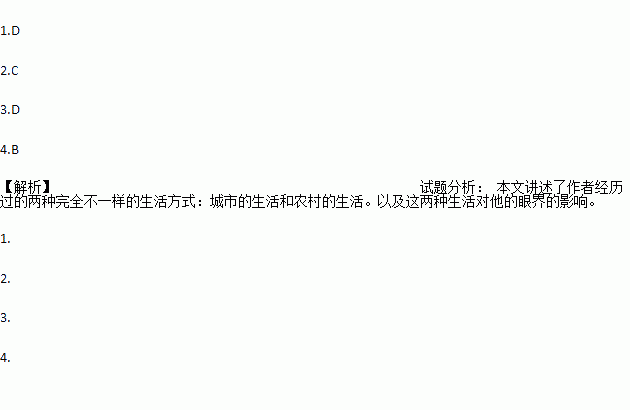题目内容
Not many people can say that they have lived in two totally different environments, and technically neither can I. I have lived in the same house in the same Connecticut town my whole life, but a lot of my childhood and teenage years have been spent visiting my family in New York City.
Wethersfield is a typical New England town, a small close community (社区) where almost everyone knows your name. My friends all go to the same high school and my parents are friendly with my friends’ parents. Most of my friends don’t realize what life is like outside this little town. Maybe every so often a few take a day trip to Manhattan or Boston, but none really knows what it’s like to live in an urban environment.
My parents are both from New York City and since they have siblings and friends who still live there, we visit a lot. From an early age I have been exposed to urban life. Jeff, one of my cousins, lives with his mother in a one-bedroom apartment in Brooklyn. He has never had his own room and has always been very much on his own. I don’t think any of my friends could understand how someone could live like that. www.manfen5.com
When I go to the city I see things I would never see in my hometown. I see poverty and people struggling to make a living. I observe a whole different pace; there, you’re just one guy living with millions of others who will never know your name.
I feel blessed to have experienced the lifestyles of two completely different places. I am grateful for the opportunities I have had. I feel that living in Wethersfield has given me a solid base in forming my character and the ability to deal in a close-knit society. On the other hand, my time spent in New York has exposed me to diverse cultural experiences. I feel that I would be comfortable in any environment and could make the best of any situation.
1.According to the author, most of his friends in the town _____.
A. have never experienced city life
B. can only understand the rural life
C. prefer the small close community
D. know little about the real city life
2.The underlined word “siblings” in paragraph 3 means _____.
A. schoolmates B. colleagues
C. relatives D. parents
3.The author’s life in New York has brought him _____.
A. his present character B. the social ability
C. the comfort of city life D. diverse cultural experiences
4.What could be the best title for the passage?
A. A Small Town and a Big City
B. A Man of Two Different Worlds
C. Experience Various Environments
D. Make the Best of Diverse Cultures
 阅读快车系列答案
阅读快车系列答案
